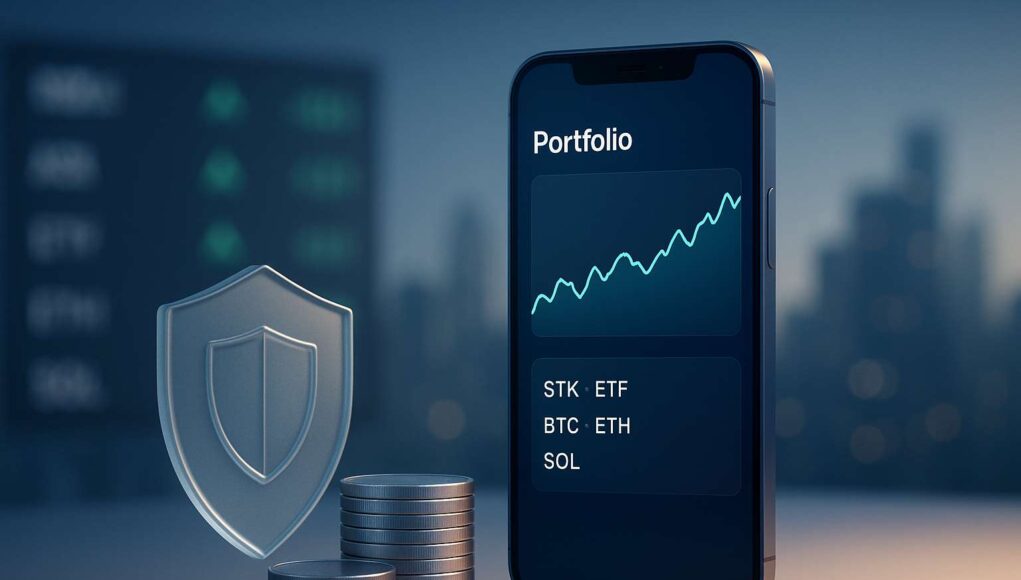Galaxy Digital (NASDAQ/TSX: GLXY) has entered the consumer finance arena with GalaxyOne, a new digital platform that merges commission-free stock trading, crypto access, and high-yield accounts. Everything comes in one regulated app, targeting U.S. investors who value stability and yield. The launch marks the company’s first large-scale push beyond institutional clients and establishes a direct competition for retail heavyweights such as Robinhood, Coinbase, and Kraken. It is Galaxy’s consumer gateway to multi-asset investing.
Bringing Institutional-Grade Finance to Retail
The GalaxyOne platform represents a significant milestone for Galaxy Digital. The firm built its reputation providing liquidity, asset management, and advisory services for professional investors. The company’s goal is clear. It allows individuals to access the same institutional-grade platform used by hedge funds and asset managers and packages this experience for the everyday investor. At launch, GalaxyOne supports the trading of Bitcoin, Ether, and Solana.
Through GalaxyOne, U.S. users can trade over 2,000 stocks and ETFs commission-free. They can buy or sell Bitcoin, Ether, and Solana. They also earn 4 percent APY on FDIC-insured cash balances. Accredited investors can even subscribe to an 8 percent Premium Yield note. The product positions the service for investing and income generation. Interest earned on deposits can be reinvested automatically into crypto assets. This feature is rare among mainstream brokerage apps. For cautious investors, this institutional-grade platform reduces friction without sacrificing control.
>>> Read more: Galaxy Digital Confirms $9B Bitcoin Sale Was Estate Liquidation
Why Galaxy Thinks It Can Win
Unlike many fintech startups that chase trading volume, Galaxy Digital’s retail platform focuses on stability, transparency, and yield. Its institutional infrastructure includes custody, trading, and risk-management systems. These form the backbone of the GalaxyOne app. The GalaxyOne platform is built on that institutional infrastructure. Users get execution quality and security trusted by institutional clients.
This approach supports Galaxy’s broader narrative as a regulated crypto brokerage for U.S. investors. It is not just another exchange. Existing partnerships, such as the Invesco Galaxy Bitcoin ETF, reinforce the firm’s credibility. The trust spans both crypto and traditional financial sectors. For long-term investors, the GalaxyOne platform offers a familiar brokerage feel with crypto access.
Competing in a Crowded Field
The launch of GalaxyOne places Galaxy Digital in a crowded corner of modern finance. Fintech apps and crypto brokers increasingly overlap.
In the U.S., Robinhood dominates hybrid brokerage and crypto trading, combining zero-fee stocks with an expanding digital-asset lineup. Coinbase remains the default entry point for crypto-first users. Kraken attracts customers who want broader token access and lower exchange fees. Against this backdrop, Galaxy Digital positions its GalaxyOne platform as a premium alternative. It offers a regulated, yield-bearing bridge between brokerage and crypto custody. Positioned as a Robinhood competitor, the app emphasizes yield and compliance. For crypto-first readers seeking a Coinbase alternative, Galaxy highlights regulation and integrated brokerage. Investors who want crypto and stock trading in one app may find the unified design useful.
Competition extends beyond the United States. In Europe, Revolut, Trade Republic, and Bitpanda have built large user bases with similar multi-asset propositions. Customers can trade equities and crypto within a single interface. These platforms conditioned investors to expect bank-like simplicity. They also deliver exchange-level functionality. The standard raises the bar for any new entrant.
Galaxy’s answer is credibility. The company holds a dual listing on Nasdaq and the Toronto Stock Exchange. It also brings a long track record in institutional crypto finance. Galaxy is betting that trust, compliance, and yield will attract older, cautious investors. Gamified competitors often underserve this group.
Strategic Timing and Broader Vision
The debut of GalaxyOne followed Galaxy’s Nasdaq listing in May 2025. That move gave the company greater visibility among U.S. investors. Institutional adoption is also accelerating through ETFs and tokenized products.
Extending services to retail customers aligns with CEO Mike Novogratz’s vision. The goal is to unify both sides of the market under a single brand.
The platform’s technology roots trace back to Galaxy’s 2024 acquisition of Fierce. The fintech startup’s app and user base now serve as the foundation for the GalaxyOne platform. That acquisition provided a ready consumer interface and about 2,500 initial users. It gave Galaxy a head start in distribution.
The Road Ahead
Despite its advantages, Galaxy Digital faces stiff challenges. Retail competition is intense, and user-acquisition costs remain high. U.S. regulators still scrutinize high-yield crypto accounts. Galaxy’s design relies on insured deposits, a limited token lineup, and strict compliance. The approach attracts long-term investors more than speculative traders.
>>> Read more: Coinbase OCC Trust Charter and the Future of Crypto
Outlook: From Institutional Roots to Mainstream Reach
Galaxy’s expansion into retail reflects a deeper structural shift toward the convergence of traditional finance and digital assets. Platforms like Robinhood and Revolut simplified access. Galaxy aims to differentiate through depth and transparency. It builds institutional infrastructure that serves individual investors. If the company can deliver on that promise and scale beyond its initial 2,500-user base, GalaxyOne could emerge as more than another crypto app. It could become a model for how regulated financial firms reimagine digital wealth management in the post-ETF era.
Readers’ frequently asked questions
Can I use GalaxyOne if I live outside the United States?
No. The service is aimed at U.S. individuals, and Galaxy has not announced availability for non-U.S. residents.
Which crypto can I trade on day one?
At launch you can trade Bitcoin, Ether, and Solana.
Are stock trades really commission-free, and are there any other costs?
Stock and ETF trades are commission-free. Standard regulatory or exchange fees may still apply where relevant.
What Is In It For You? Action items you might want to consider
Confirm eligibility and protections
Verify you are a U.S. resident with the required identity documents, then review the account disclosures to identify the program banks that hold swept cash and how FDIC coverage applies to your balances.
Compare before you switch
Do a quick side-by-side with your current provider on commission policies and any regulatory or exchange fees, the 4% APY terms and caps on cash, the available crypto list at launch, and any limits or timelines for transfers and withdrawals.
Fund safely and test first
Enable strong security such as TOTP-based two-factor authentication and a device lock, move a small ACATS or crypto test amount to confirm routing and networks, then proceed with the full transfer once the test settles correctly.










